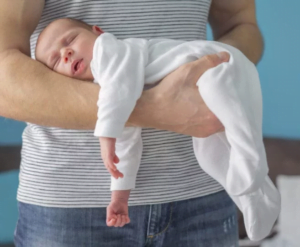How to Calm a Crying Baby in 5 Seconds

Crying can be a normal part of a baby's development and is really the only means they have to communicating their needs. Even when you know this it can be really tough for you as a parent or carer, especially when it seems like nothing is helping. Here are five tips that may help you calm a crying baby in just a few seconds.
Check the Basics

Before trying to sooth your baby it’s always a good idea to check your baby is not hungry and doesn’t have a dirty or wet nappy. You’ll be surprised how often little people eat, poop and pee! It’s also worth bearing in mind that babies generally don’t like being undressed and having their nappies changed, so this can make matters even worse in the short-term, try not to worry and carry on. It’s also true that many babies cry initially when they are put down for sleep. It can be worth waiting a few minutes before picking them back up if you think they’re tired. You might be surprised at how quickly they go from full volume to fast asleep!
Some babies cry persistently despite being dry, fed and well rested. Doctors and midwifes tend to describe this condition as 'colic'.
What is Colic?
Colic is when a young babies is physically well but cries for long periods without a clear cause. The exact reason why colic happens is not known. Some research suggests it's to do with how young babies handle gas inside the gut. Other research suggests it is trouble some babies have processing all the new stimulation of the noises, lights and touch from the outside world. Colic gets worse in the first few weeks and last up to 3-4 months of age. It can be really distressing for you as a parent and you should speak to your midwife or doctor if you are concerned.
Physical Comfort

Babies often find comfort in being held close and feeling the warmth and heartbeat of their caregiver. Newborn babies usually like being held with their legs tucked up into their tummy and a hand supporting their neck and head. Try gently rocking your baby or patting their back or bottom to help soothe them. This can simulate the mother’s heartbeat and help calm your baby. Carrying your baby in a carrier is a great way to keep your baby close while you can have your hands free to get on with things!
Tiger in the Tree

Many babies have a certain position which they prefer to be held. As well a cradling in your arms you can try holding them more upright against your chest or try the 'tiger in a tree' position, which can be especially good for babies troubled by colic.
Swaddling

Swaddling can help your baby feel secure and warm, which can help calm their crying. Be sure to wrap your baby in a lightweight blanket, making sure their arms and legs are snugly secured.
White Noise

Some babies find the sound of white noise, such as the sound of a hair dryer or a vacuum cleaner, soothing. You can try using a white noise machine or simply turn on a fan to see if it helps calm your baby. The womb is a very noise place and white noise is thought to sound similar to the sounds they hear before birth.
Dummies or Pacifiers
Even when your baby is not hungry they will have a constant sucking reflex and sucking can be soothing. A dummy or pacifier can help calm them. Just be sure to sterilise them before giving it to your newborn baby to prevent the risk of infection and always try a feed before offering a dummy, especially in the first few weeks and if breastfeeding.
It's important to remember that all babies are different and what works for one baby may not work for another. If your baby's crying persists and you're unable to calm them, it's always a good idea to check in with your doctor or midwife for advice.
We hope you found this article useful. Did you know that the Poppet community is a great place to find more helpful tips and resources for your family as well as flexible childcare from local parents and approved providers, all at the touch of a button. Register here today!
And here’s a list of other great resources to keep your family healthy and well
https://www.healthychildren.org/
https://www.nidirect.gov.uk/conditions/childhood-illnesses
https://www.sja.org.uk/get-advice/first-aid-advice/paediatric-first-aid/
https://firstaidchampions.redcross.org.uk/primary/first-aid-skills/
https://www.healthhub.sg/programmes/183/parent-hub
Disclaimer: We hope this helps your family if your little ones are unwell. Please remember this article is for education purposes and does not constitute medical advice. You should seek advice from a trained medical professional if you have concerns about your child’s health.

